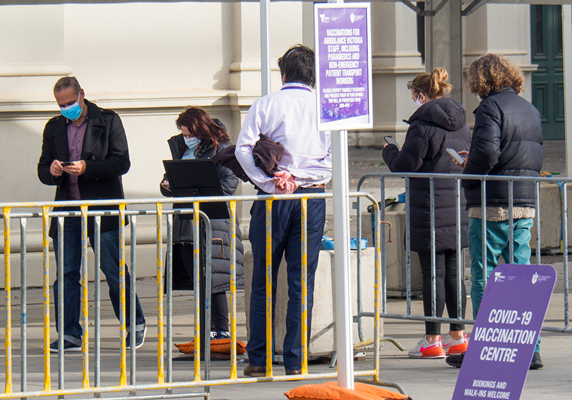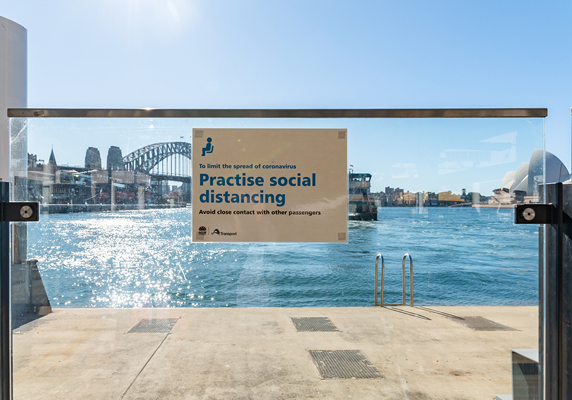“While venues and events have the right to dictate the terms on which they will allow people to enter premises, or attend venues, this remains subject to external considerations such as anti-discrimination and privacy laws.”
A ticket to freedom or a rubber-stamped restriction of our rights? As the debate rages about mandating vaccinations or incentivising those who get the jab done with exemptions from border closures and lockdowns, whose side is the law on?
Australia is ticking ever closer to two years of closed international borders; and our passports may soon be less about an overseas adventure than certification for the local café. Speculation abounds over whether vaccine passports will be the golden ticket for a return journey to life as we once knew it.
Prime Minister Scott Morrison said on August 13 “the whole point of getting to higher and higher levels of vaccination, particularly once you go past 80 per cent [fully vaccinated], is that is when we are saying goodbye to lockdowns.”
Morrison indicated his support for the spoils of being vaccinated: “If you get vaccinated, there will be special rules that’ll apply to you … Why? Because if you’re vaccinated, you present less of a public health risk.”
But where do “special rules” sit in the law? At a federal level, restrictions on outbound movements have been made and extended under the Biosecurity Act 2015 (Cth), granting the Health Minister extraordinary powers to curtail movement to and from our shores. At a state level in NSW, public health orders are (at time of writing) restricting residents to stay within a few kilometres of their home and only leave for “essential reasons” including grocery shopping, medical treatment and urgent care for the vulnerable.
A suite of court judgments on some restrictions – including the night curfew in Melbourne’s 2020 lockdown, the Federal Court case on the temporary ban on flights from India and the move by Clive Palmer against Western Australia’s border closure – have consistently sided with the Government’s approach, which is based on the advice of their senior health officials.
While this new decade has seen Australians adapt to restrictions on their movement in a manner that would have felt outrageous only two years ago, some legal bodies and human rights advocates believe much of the population may soon reach its tipping point. Many feel vaccine passports could become more acceptable if they are a ticket to easing restrictions such as the international travel ban, and snap state border closures and lockdowns. It is likely to require buy-in from all states and territories, not just top-down political rhetoric.
 Kiri Jervis
Kiri Jervis
“Any future vaccine passport system is likely to involve authorisation by the State and Territory governments,” Kiri Jervis, Partner and workplace relations expert at Clyde & Co, tells LSJ.
“While venues and events have the right to dictate the terms on which they will allow people to enter premises, or attend venues, this remains subject to external considerations such as anti-discrimination and privacy laws.
“To make a vaccine passport system work as an integrated national approach, it is likely that State and Territory governments would need to give them effect in law, such as through the public health orders.”
Vaccine passports worldwide
Despite weeks of protests on the streets of Paris, France succeeded in expanding its proof of vaccination requirement in late July, to anyone who wishes to dine in at a restaurant or café, go to a gym or a theatre or catch long-haul public transport. Italian citizens did not protest as vigorously against a similar national health pass that is required for permitted entry into a suite of venues.
Despite protests, some drawing more than 200,000 people, surveys in the European countries indicate much of the population approve of the edict.
However, countries that already have rolled out passports have some critical differences compared with Australia: their vaccination rates are much higher, the entire adult population (and in some cases, children) are eligible for a vaccine, and they have dispensed with lockdowns and shutting businesses as a means of virus control.

“Although a number of countries, particularly in Europe, have implemented vaccine passport systems, these are also relatively new, having been put into place over the past few months,” Jervis says.
“We can certainly take note of some of the measures being taken by countries, which have tried to ensure some measure of fairness in their implementation strategies. For example, the UK has flagged in its development of a vaccine passport that it will not be used to access essential public services, such as public transport and supermarkets.
“Another aspect of vaccine passport implementation which is important will be flexibility, depending on the current public health environment. For example, when infection rates declined, Israel stopped using its ‘green pass’ system but has since brought it back in light of the Delta outbreak.
“Other options include ‘health passes’ which are being used in some countries for live entertainment events and require a person to have been vaccinated or tested negative (or both), a music festival in Chicago will require those attending to bring a vaccine card for proof they have been fully vaccinated or proof of a negative COVID-19 test within the last 72 hours.”
While US President Joe Biden has used the levers available to him to mandate vaccination in federal workers, the application of passports varies depending on the state. More than 18 months on, states like Texas are still squabbling over mask mandates. The US, unlike Australia, has a Bill of Rights. However, there is caselaw precedent that public heath trumps individual choice.
In the state of Massachusetts, a Supreme Court decision in 1905 made it lawful for cities to require vaccination against smallpox. The judgment was in response to a challenge that a requirement for vaccination breached the man, Henning Jacobson’s, Fourteenth Amendment right to liberty. He also claimed vaccines were at best, ineffective, and at worst, harmful.
In its decision, the Massachusetts Supreme Court held that the law was a legitimate exercise in protecting the health and safety of the state, and that necessity overrides individual liberty.

“To make a vaccine passport system work as an integrated national approach, it is likely that State and Territory governments would need to give them effect in law, such as through the public health orders.”
Freedom or a dose of discrimination?
Australia’s sluggish rollout could block a widespread introduction of vaccine passports, at least in the short-term. While certain cohorts and age groups have been able to get a COVID-19 vaccination since February 2021, children aged 15 and under are not eligible, except in very limited circumstances, and adults under-40 are now taking up the AstraZeneca vaccine in droves after months of being warned by the Australian Technical Advisory Group on Immunisation [ATAGI] it was “preferred” they wait for Pfizer.
“Of course, we won’t see this crystallise until we have higher vaccination rates and greater access to vaccines for all Australians, at which point more visible steps will likely be taken towards vaccine passports,” Jervis says.
“A vaccine passport assumes that there is equal access to vaccines and equal access to the systems and processes that would enable a person to obtain and carry a vaccine passport.”
The Australian Human Rights Commission last month published its considerations about the prospect of vaccine passports, noting “until everyone in Australia has access to a vaccine, any vaccine passport model that applies to everyone would be unfair”.
But once the eligibility issue passes, questions of discrimination linger. The human rights body believes many groups could be at risk of discrimination if an “inflexible” stance is taken on vaccine passports. Those groups include those with health conditions or a disability that renders them ineligible for a COVID-19 vaccination, those who still are not eligible for a vaccine (depending on the passport’s timing), marginalised groups that may seek to avoid contact with government agencies, including migrants, and digitally excluded groups such as those without access to smart phones or printers, and those with difficulties using technology, including some older people and some with disabilities.
“Vaccine passports have significant implications for privacy and autonomy, freedom of movement and association, equity and discrimination, particularly when it comes to accessing everyday goods and services,” the Commission argued in its advice.

“If and when a vaccine passport is introduced, its use would need to be flexible enough to ensure that people who are unable to be vaccinated do not face discrimination, particularly in accessing essential goods and services.
“There may be stronger arguments for vaccine passports in uses such as: in the international travel sector, where they are designed to enable the relaxation of existing strict restrictions on travellers, in higher risk sectors where vaccination or testing is routine and required for the protection of vulnerable community members such as the aged care sector, and to enable the holding of public events which would not otherwise be able to take place.
“The case for vaccine passports in other areas of public life, including by small entertainment venues, pubs and restaurants, is less compelling as the risks are lower and the potential for unfairly excluding people from access to these services is higher.”
Jervis says, “public health measures need to ensure that they are not implemented in a way which causes undue hardship for people who cannot be vaccinated”.
“In the case of a vaccine passport system, those who are unable to be vaccinated for example due to a medical condition should not have to be inconvenienced in proving and explaining their vaccination status when other people are able to display a certificate on their phone or scan a QR code,” she says.
“Any system which is rolled out should consider these people from the outset, in its design … ensuring that everyone has access essential services and activities regardless of their vaccination status.
“The system should also contemplate how exemptions will work. For example, a vaccine passport could provide not only certification of a vaccine, but also certification that a person has a valid exemption if they are unable to be vaccinated. In this way, people at the frontline will not be put into the difficult position of needing to discuss health information with clients and customers or having to make an assessment on the spot as to whether a person has a valid exemption.”
 Pauline Wright
Pauline Wright
“Governments across Australia have the right under our Constitution to impose conditions about who passes their borders, including imposing health restrictions
and proof of vaccination.”
A safe journey to reopening
Despite no end in sight for NSW’s current outbreak of COVID-19, Premier Gladys Berejiklian continues to flag an easing of some restrictions and small freedoms for fully vaccinated people in the state over the next two months.
Politically, it is unlikely to backfire. A study conducted by the University of Sydney and the University of Western Australia in May, before the Delta strain took hold in Sydney, found almost three-quarters of Australians supported mandatory vaccination for work, study and travel.
“The appetite for restriction on movement, and curtailment of other civil liberties, seems to be proportionate to the perceived level of risk,” Jervis says.
“As greater numbers of the population are vaccinated and other tools to manage the risk are more widely implemented (such as rapid testing), the restriction on movement will likely become a greater cause of concern for the community.
“This will also be reflected on the response to lockdowns – people who are fully vaccinated are probably going to want greater freedoms in the near future.”
The NSW Council for Civil Liberties has backed the use of vaccine passports, saying “while we support the right to refuse a vaccine, we also support the introduction of passports, although any restrictions must be temporary and proportionate”.
“Governments across Australia have the right under our Constitution to impose conditions about who passes their borders, including imposing health restrictions and proof of vaccination,” President Pauline Wright said.

“And in order to protect the safety of their workers, businesses have a right to say who comes on to their premises.”
In capital cities where businesses are feeling the strain of extended shutdowns, there is increasing agitation for a reopening for vaccinated customers.
The Committee for Sydney wants a timeline to put in place for when CBD businesses, drained of revenue as employees work from home, can reopen for fully vaccinated customers.
Ehssan Veiszadeh, the Deputy CEO of the Committee and a former senior staffer to Berejikilian, believes “in this new phase of the pandemic, people may have the right not to be vaccinated, but they shouldn’t have the right to put others in danger”.
“There is no reason why vaccine passports shouldn’t start being used now across industries that are already open, such as in retail settings and essential workplaces,” Veiszadeh said in a statement.
“Once we begin to emerge out of restrictions, these can be expanded to gyms, cinemas and tourist attractions.”
Proportionate and privacy aware
After almost two years of restrictions, many believe vaccine passports
must strike an appropriate balance between freedom and a further impeding of liberties.
“Any response to protect public health needs to have a nuanced approach to ensure that it is necessary and proportionate to the risk,” Jervis says.
While NSW residents are well versed in using Service NSW to record their movements for health contact tracing purposes, she says “privacy will certainly be a concern in relation to the collection and storage of the data”.
“Interestingly, the Federal Government has flagged that it will need to consider how it will link information between different departments given that some departments, such as DFAT, do not necessarily have a statutory basis for collecting information about vaccination status.
“It will be important to consider sunset clause and data retention periods which are reviewed and adapted to ensure that they remain appropriate and proportionate … [and] to regulate what can be done with any data collected in relation to vaccination status.
“It will also be important to include sunset clauses so that a vaccine passport system is only in place for as long as it remains necessary and proportionate to protect public health.”
Cherish the thought.




